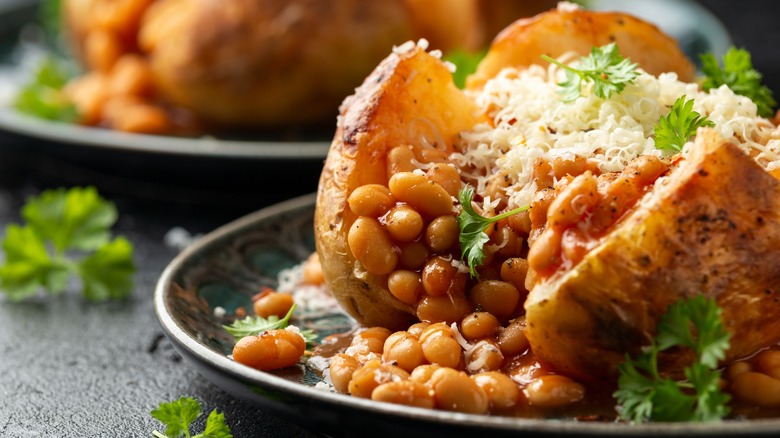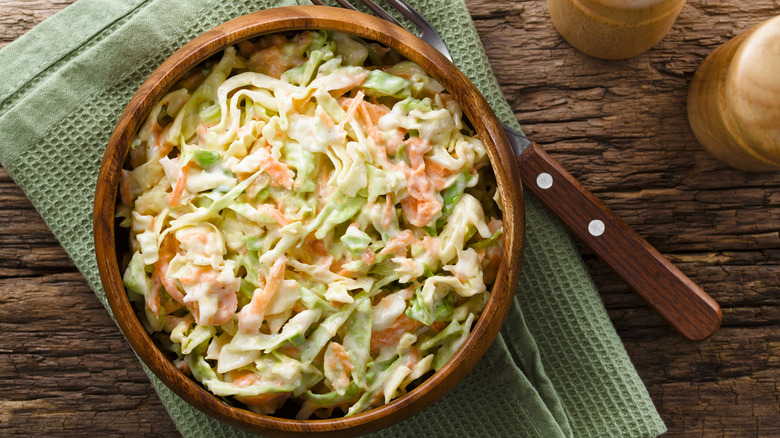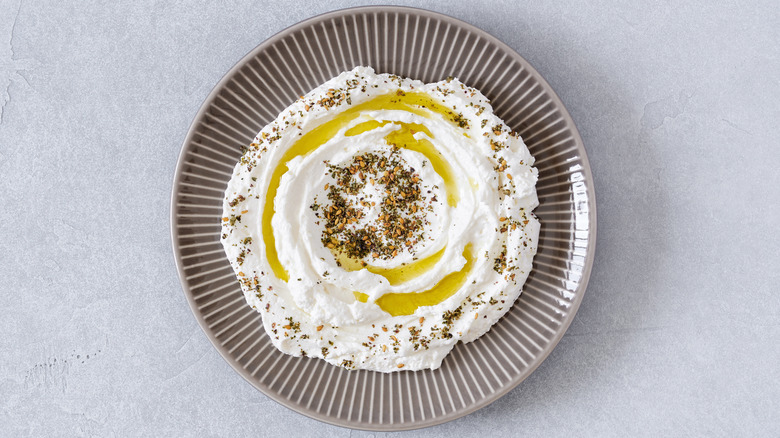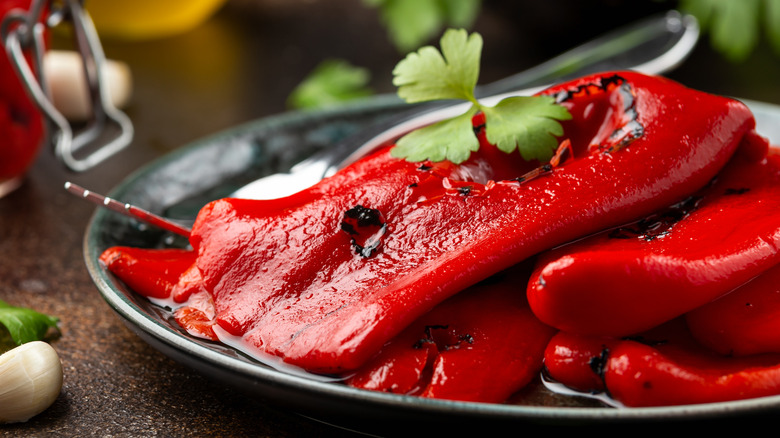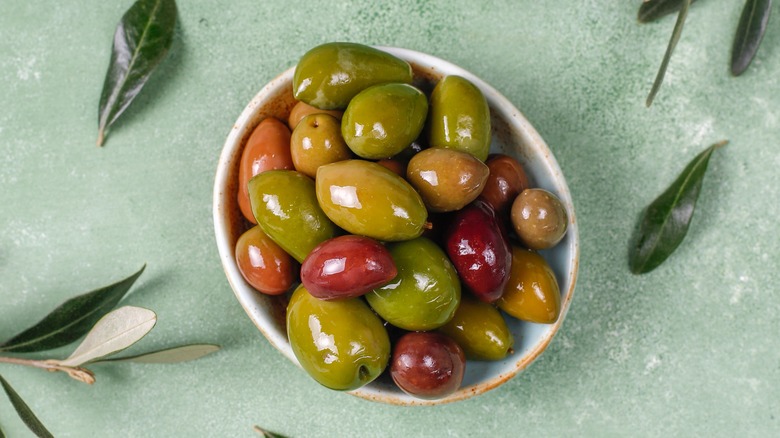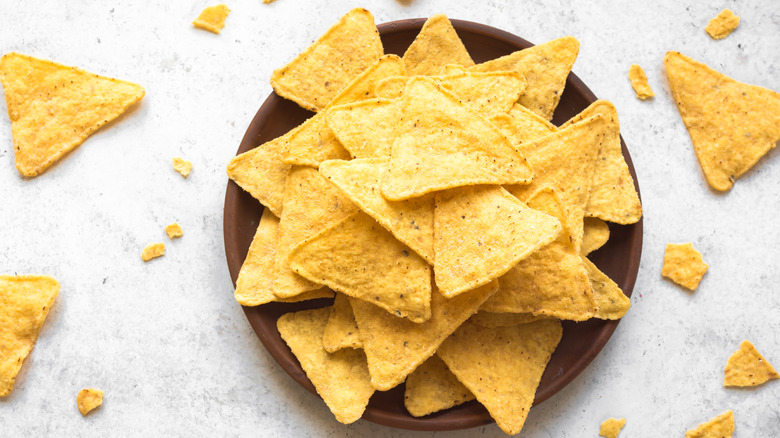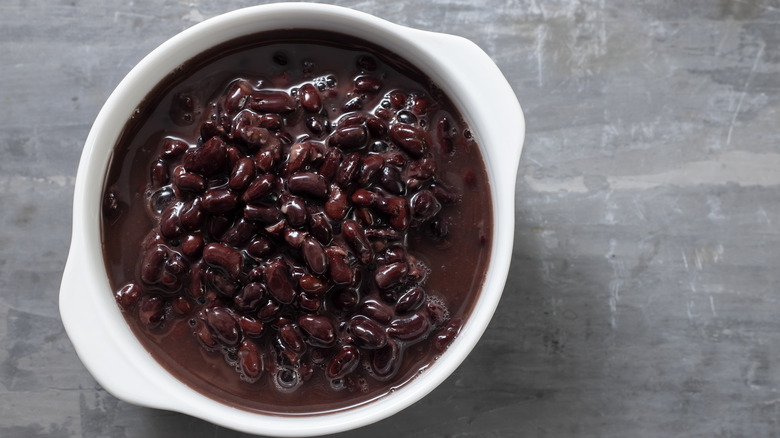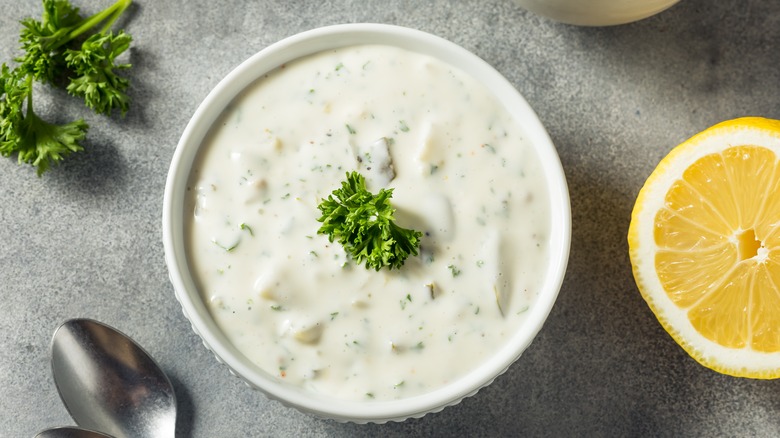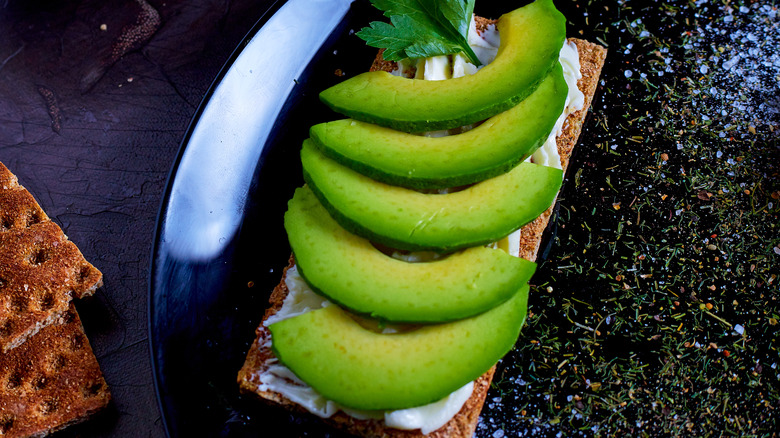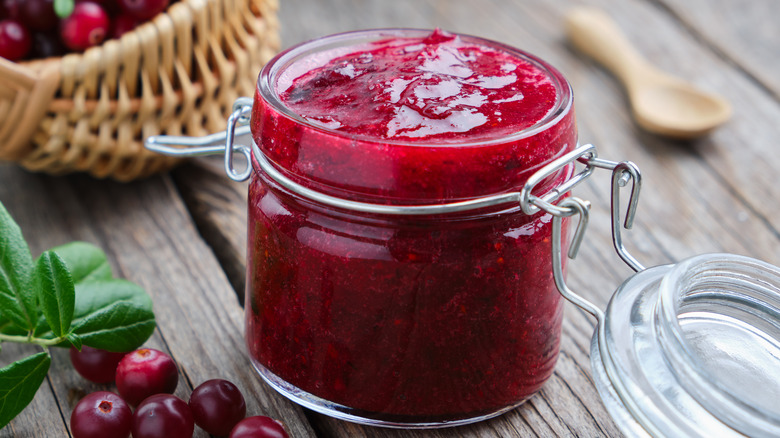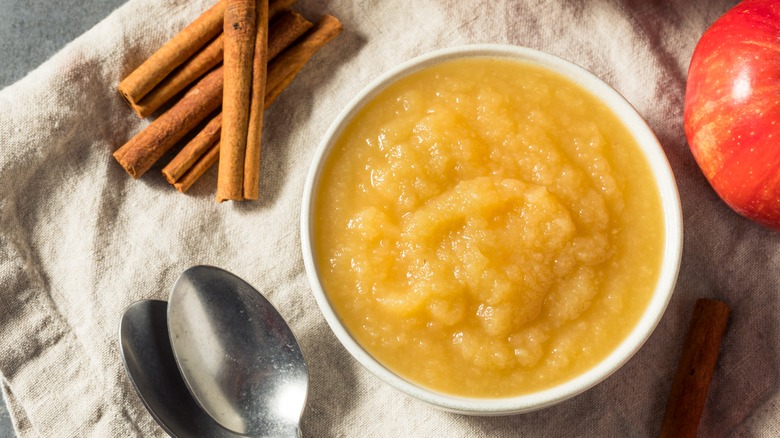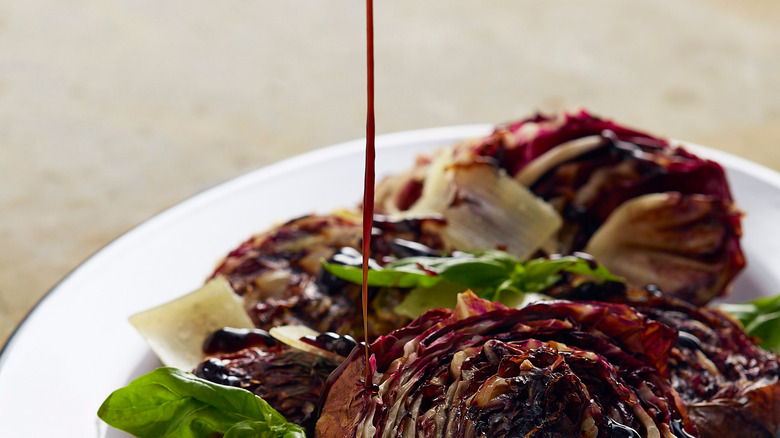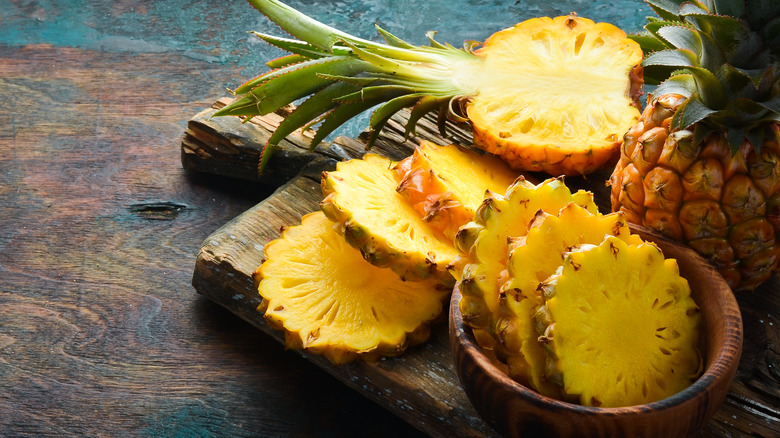12 Toppings That Probably Shouldn't Make It On A Baked Potato
The baked potato has been a lunchtime staple in the U.K. for decades but is apparently just entering the gastronomical lexicon here in the U.S. (via UniLad). As more and more Americans are introduced to the carb-loaded grub, many will start experimenting with toppings that may not fit the conventional list of toppings you'd expect.
Although the classic baked potato is covered with butter, a sprinkle of cheese, and maybe some leftover chili, plenty of toppings work well with this root vegetable from the Gods. That said, some toppings should stay away from this dish, as they're just going to ruin the experience.
There are a few culprits in terms of toppings that you should avoid. While opinions may differ regarding toppings, there are some ingredients that are simply unsuitable for a baked potato. Many toppings are delicious in their desired culinary context. However, there are only a few toppings that actually complement and enhance the flavor of the humble baked potato. If you want to try something new, there are some things you should be putting on your baked potato to get the most out of this hearty meal.
1. Coleslaw
No good barbeque is complete without a bit of coleslaw slapped on the edge of a plate. This sweet, mayonnaise-heavy cabbage sauce is a great, light-tasting palette cleanser that serves as a perfect accompaniment to smoked and saucy meat, but it shouldn't go anywhere near a baked potato. This is because the flavor profile completely contradicts the purpose of a baked potato. This meal is designed to be heavy and filling and works best with rich flavors, and the bitter, sweet, and sour tang of the coleslaw actively goes against the potato.
Another strike against coleslaw is that it's a condiment that's best enjoyed cold. Putting coleslaw atop a steaming baked potato will warm up the coleslaw, which can cause the oil and vinegar to separate from the coleslaw in an unappealing. Besides these negatives, many fitness influencers recommend coleslaw as a healthy topping for baked potatoes. This should be ignored, though, as coleslaw is usually pretty unhealthy, thanks to the dressing being made with high-fat mayonnaise and containing a lot of sugar in most cases. In fact, most of the calories in coleslaw stem from the mayonnaise, according to The Donut Whole.
2. Greek yogurt
The issue with using greek yogurt being a topping for a baked potato is that there's simply no need for it. Greek yogurt is pretty tasteless and, at most, will add a super slight tang to your baked potato. In theory, it can make your potato a bit creamier. However, in practice, the high amount of protein and low saturated fat in the yogurt will cause it to curdle as it's warmed by the jacket potato: Greek yogurt is best when it's served on its own, allowing you to spoon it on dishes or dip your food into it.
Many people use greek yogurt as an alternative to sour cream. However, if you're doing so, it's best to go with sour cream as yogurt will give your baked potato an awful texture. Greek yogurt is a versatile condiment that is brilliant as part of breakfast and as a filling in gyros and wraps; however, you may want to reconsider using it as a topping for a baked potato
3. Roasted red peppers
Peppers aren't inherently bad as a topping for a baked potato, as diced raw peppers can add a nice refreshing crunch to the baked potato and work well alongside a warm chili topping. However, roasted peppers, especially the pre-roasted ones sold in jars, are a terrible option for topping baked potatoes. The reason for this is that roasted peppers are usually stored in oil.
If you top a baked potato with peppers, the oiliness will seep over and into the potato to create a mussy, oil-logged mess that won't taste particularly good. Additionally, the texture of the roasted peppers does not complement the baked potatoes. The peppers are typically pretty slimy, which massively contacts the firm softness of a baked potato. It can create a pretty unpleasant mouthfeel that may turn you off baked potatoes forever, which would be a shame. There are plenty of meals that can benefit from the addition of roasted red peppers. If they're kept away from baked potatoes, peppers can become your new secret weapon in the kitchen.
4. Sliced olives
Olives are a polarizing fruit at the best of times: Some adore the brine flavor, while others just can't enjoy it. According to Zippia, olives are the most hated food in the United States, with 13 states declaring it the worst out of all. Interestingly enough, the reason people may like or dislike olives could be based on their age. According to The Telegraph, it takes 22 years for people to start appreciating 'grown-up' foods such as olives and anchovies. This is usually because our taste buds change and alter as we grow.
That said, most people can agree that despite their thoughts on olives as an individual food, sliced olives shouldn't be put on baked potatoes. This is because olives have a super bitter and sharp taste that doesn't work well with potatoes. Olives are also super salty because of how they're processed and stored in brine, and that saltinedd can be enhanced when it's combined with potatoes, which can create an overbearing flavor.
5. Crushed tortilla chips
America has a bit of a craze for adding crushed tortilla chips to various dishes: Just have a look at TikTok. Doritos, in particular, can enhance many dishes that would have usually been coated in panko bread crumbs, and they offer an easy way to make some tasty fried chicken at home. That said, you won't actualize any great culinary hacks by topping your backed potato with crushed tortilla chips.
Depending on the chip's flavor, using tortilla chips will not help add many distinct tastes to your bakes potatoes apart from a salty or faint cheesy kick. Crushed tortilla chips will add a crunchier texture to your baked potatoes, which can be interesting for the first couple of bites.
The issue is that if you plan to top your baked potato with tortilla chips, you must first put something on your potato so that the chips can stick. If you are desperate to add crushed tortilla chips, fill your jacket potato with a nice chili to help you build a pleasant, Tex-Mex flavor profile. Or you can ditch the tortillas entirely and top your potato with typical nacho toppings like sour cream, pulled pork, or cheese.
6. Black beans
Some beans work great with baked potatoes, but not all are created equal. In the U.K., baked beans are the most popular baked potato topping. This combination is recommended, but don't think you can remix the recipe and replace baked beans with black beans. The reasons for this are twofold. The first is that black beans are pretty bland, especially on their own. The main purpose of black beans as an ingredient is to bulk out a meal, adding more nutrients without impacting the overall flavor. This is why beans work really well in chilis.
Even if you can give your black beans a nice flavor, there's another reason why they should be avoided. This is because when beans are combined with potatoes, the entire meal becomes super filling and stodgy, and you'll likely end up feeling quite uncomfortable when finishing this dish. According to Clean Eating Mag, black beans contain a lot of fiber, which will make you feel fuller for longer. Baked potatoes are just as filling due to their carb content, so mixing them might fill you up for a few hours.
7. Ranch dressing
Ranch dressing is an iconic condiment in the United States, and it's not hyperbolic to say that it's beloved across the continent as a condiment. The sauce is distinctive: It has a tangy taste and cool feel, and it has grown to become massively popular as a Doritos flavor and as the dipping sauce of choice for many pizza companies. Ranch gets its taste from a wide variety of ingredients, including allium (a mix of garlic and onions), sour cream, and herbs like dill and parsley. It all comes together to create that rich, all-permeating flavor that we love, which is why it's not a good option for a jacket potato.
Ranch dressing is an incredibly overpowering condiment and usually gatecrashes a dish and tasks center stage as the main flavor profile. This is why it's best paired with other foods that have a strong, distinct flavor, as the condiment can collide with the main dish to create unique and fun tastes. The issue is that baked potatoes don't offer many flavors on their own, so topping them with ranch will lead to an overwhelming and robust flavor of the topping and nothing else. Honestly, you'd be better off drinking the sauce straight from the bottle.
8. Avocado
Avacado has become the flagship fruit of the entire millennial generation, and it seems to have crept its way onto various dishes. In truth, the avocado has a lot going for it: It's healthy, it's filled with essential fats, and it also offers a lovely creamy texture. That said, avocado alone can be pretty bland, especially if it's not blended with other ingredients.
If you're a regular guacamole eater, you may be confused with this verdict, as it's hard to argue that guacamole isn't tasty. The truth is that the main flavors in guacamole stem from lime, onions, and a few spices that enhance and change the basic taste of avocado.
Even if you add avocado to make great guacamole, it won't work well with a baked potato. This is because guacamole is typically best cold and, like many other sauces, it will curdle when warmed by the hot potato underneath it. Avocado can work on a baked potato when paired with other Mexican flavors such as chili.
9. Cranberry sauce
Cranberry sauce is a common condiment that you may find on the table as an accompaniment for roast dinner, particularly pork or turkey: Cranberry sauce tends to be a significant player in Thanksgiving Diners.
The sweetness of the cranberry sauce accents the white meat nicely, creating a savory yet sweet blend that many diners can't get enough of. That said, you want to avoid using this sauce as a topping for baked potatoes. The reason for this is pretty straightforward; potatoes are best as a savory meal, so adding something sweet to them will throw off the taste.
Cranberry sauce is almost always paired with a stronger flavor, such as a smelly cheese or meat, accenting dishes to give them a sweet twist. If cranberry sauce is paired with a jacket potato, it will overpower the dish, creating a tart, almost sour flavor that most won't find desirable. You can definitely use a sweet and tart cranberry sauce recipe if you're inspired to pair it with some pork or turkey; however, it's best to avoid using it as a baked potato topping.
10. Apple sauce
Apple sauce is somewhat similar to cranberry sauce and doesn't work well with a baked potato for pretty much the same reasons. While this sweet sauce is perfect for pork, putting it on a baked potato creates a sourness overload that results in the loss of the potato's texture and taste.
Apple sauce is a pretty simple condiment to make: It entails cooking apples with water or apple cider, and the acidic apples create a finer purée as a result. Apple sauce goes really well with pork, and it's not just because the flavors work well together. The acidity of the apples aids in digesting the fatty pork. According to Healthline, this is because apples are rich in pectin, which helps with digestion as it bypasses the small intestine.
This is why it's best to pair apple sauce with fatty foods; it makes for a lighter dining experience. Another issue with combing apple sauce and jacket potatoes is that the sauce will start to curdle in the heat. Plus, the flavor will struggle to combine and penetrate into the baked potato, leading to a separation of flavors that don't really complement each other.
11. Balsamic glaze
Balsamic glaze is commonly used in Mediterranean cooking, especially in Italy. It's a super sweet sauce that can enhance a lot of meals, as it is often mixed in with olive oil to create a dip for bread. You only need a small amount of it to add flavor to a dish, which is why it won't work on baked potatoes.
You may be encouraged to cover your rotation of baked potatoes with this thick, sickly glaze; however, it can really overpower the potato and dominate the flavor with a vinegary taste that a lot may find unpleasant in high concentrations. In addition, the glaze will also be super sticky when topped on the baked potato, creating an unpleasant mouthfeel as you try to chew it.
Ironically, the balsamic glaze is used when cooking smaller roast potatoes and is a go-to recipe for UK celebrity chef Jamie Oliver. Try Jamie Oliver's recipe if you're desperate to put balsamic glaze on your potato. When balsamic glaze is combined with roast potatoes, more of the glaze is penetrates the potatoes to create an overall great flavor.
12. Pineapple
For most people, topping bakes potatoes with pineapple is unthinkable, as it should be with many other fruits, but since we are a nation that has put pineapple on pizza, this topping really needs to be warned against. Amazingly, People.com found that 44 percent of individuals surveyed believe that pineapple belongs on pizza.
Pineapple is a great ingredient for tropical, fresh dishes, and it can definitely enhance seafood and chicken, creating a familiar sweet and sour taste. The issue with putting pineapple on potatoes is that their juiciness and freshness don't work with the purposeful stodginess of the baked potato.
Additionally, the textures won't work together either, as the pineapple will attain a fibrous feel that doesn't go well with the mushiness of the baked potato. Using pineapple as a topping will create an overly sweet flavor that doesn't suit the vibe of a baked potato it needs hearty, comfortable delights instead.
